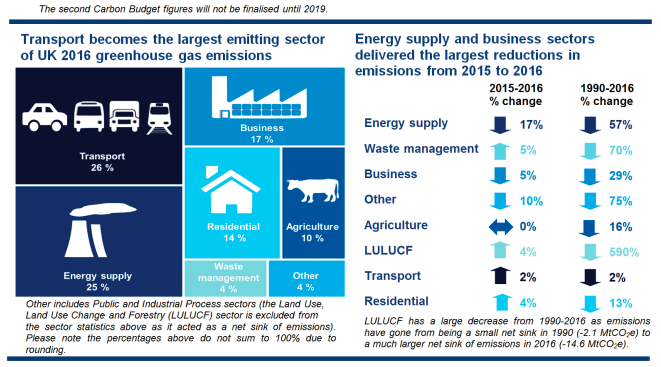Transport has overtaken the energy supply sector as the largest contributor of UK green house gas and carbon dioxide emissions.
Statistics released by the department for business, energy and industrial strategy (Beis) show falling coal generation in the power sector is driving the broader energy sector’s decarbonisation.

Worsening economics for coal generators due to carbon pricing and growth in renewables capacity led the power sector to reduce overall emissions by 17% in 2016 compared to 2015 levels. That follows a fall of 12% in 2015.
Overall transport emissions increased by 2% in 2016 and now represent 26% of UK emissions compared to 25% from the power sector.
Against 1990 baseline levels, the UK has decarbonised by 36% and reduced total greenhouse gas emissions by 41%. The energy sector has reduced emissions since 1990 by 57%, despite a 9% rise in final energy demand over that period. The transport sector has decreased emissions 2% in 26 years.
Emissions from business, responsible for 17% of overall emissions in 2016, declined by 5% year on year and have dropped 29% since 1990. Some of that reduction is attributable to energy efficiency, much of it to the decline of British heavy industry.
Housing emissions increased 4%, the same rise recorded in 2015.
Beis said the UK is on track to meet the second Carbon Budget.
See the full data here.
Related stories:
Energy supply emissions fall 12%, housing and transport rise
Flat carbon price could see coal output double
Renewables capacity hits 38GW as coal prepares for extinction
UK loses 11.4GW of coal and gas fired generation in three years
Gas picks up coal’s share as renewables output remains flat
UK gas demand hits five year high as coal tanks
Mini nukes ‘could decarbonise heat and transport and balance renewables’
Forget small nukes, ditch coal faster and focus on storage and DSR
Society must rethink its approach to electricity use, says Ofgem networks chief
Follow us at @EnergystMedia. For regular bulletins, sign up for the free newsletter.



